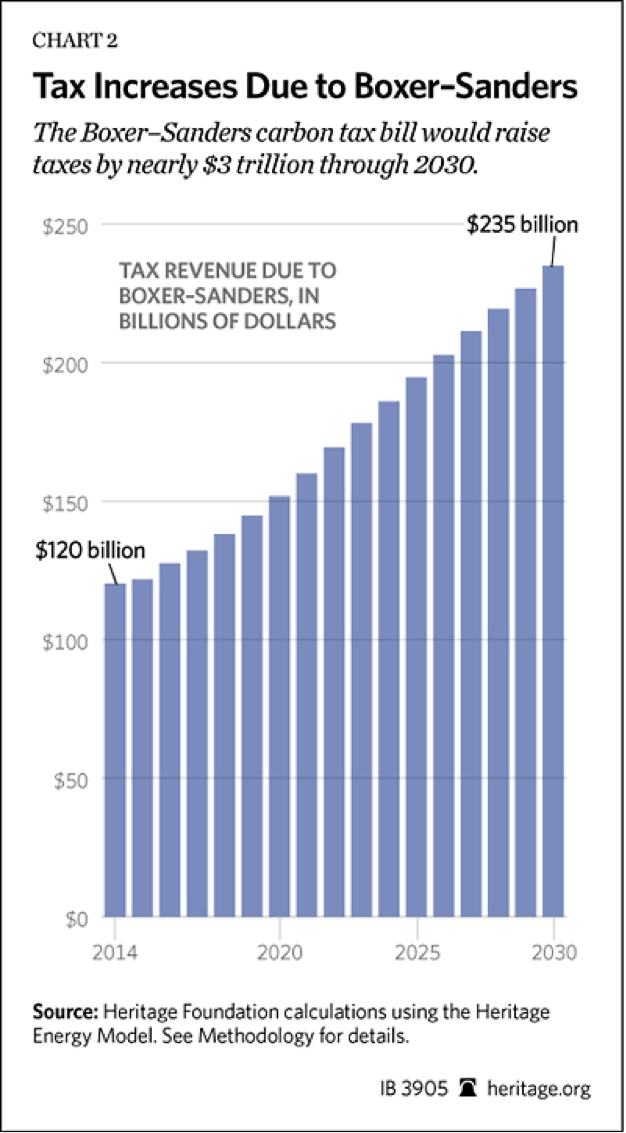Over the summer, the Institute for Energy Research (IER) hosted a conference entitled, “A U.S. Carbon Tax: The Rest of the Story.” We picked experts from both academia and policy analysis to demonstrate that the American public has been getting a very biased perspective on the case for a carbon tax. Even if we accept at face value the official position of the U.N.’s Intergovernmental Panel on Climate Change (IPCC) on the natural physical science of greenhouse gas emissions and climate change, the economic science doesn’t automatically point to a U.S. carbon tax the way its proponents would have us believe.
I have already posted about my own presentation on the panel (concerning some surprising facts about the “social cost of carbon”), the talk given by Dr. Ross McKitrick on the alleged “double dividend” of carbon taxes, and the presentation by Dr. Kenneth Green on why he changed his mind about carbon taxes. In this final post, I’ll cover the remarks from Dr. David Kreutzer of the Heritage Foundation.
Kreutzer was the final speaker on our panel, and as so often happens he kept his talk brief in order to leave time for Q&A with the audience. But when you watch the video below, you’ll see that he provided a powerful conclusion to our formal remarks. By summarizing the quantitative estimates he and his colleagues developed, Kreutzer have a sense of how harmful a carbon tax would be to a typical American family. He also gave some frank remarks about the nature of Washington politics when it comes to “tax reform.”
Kreutzer’s Presentation With Highlights
Below is the video for Kreutzer’s presentation, or the YouTube link is here. Underneath the video I highlight key moments from his talk.
- 0:00 – 1:00 Kreutzer explains that he and his colleagues (especially programmer Kevin Dayaratna) at the Heritage Foundation took the EIA’s code for its National Energy Modeling System (NEMS) as the basis for their own simulation of the economy—and in particular the energy sector—in response to a hypothetical carbon tax. Specifically, Heritage estimated the impact of the Boxer-Sanders carbon tax proposal, which starts at $20/ton on CO2 and rises at 5% per year.
Here is a chart from the report showing the effect on employment of a carbon tax:
- 1:20 – 2:30 Kreutzer wants to clarify thinking on the economic impact of a tax, to distinguish the deadweight loss from the revenue gain. He asks the audience to imagine a hypothetical $3 million/gallon tax on dairy products. Perhaps when the dust settles, Bill Gates ends up being the only person to buy one gallon of ice cream per year, with no other American buying any dairy products again. In D.C., Kreutzer explains, they could then take that $3 million and give every American a penny. Thus the whole thing would be “revenue neutral.” Yet this obviously would understate the economic devastation such an outrageous tax would wreak, as it destroyed the dairy industry and made consumers go without milk and other dairy products. Kreutzer’s point, of course, is that merely insisting on a “revenue-neutral carbon tax” doesn’t protect Americans from the economic harms of higher energy prices.
- 2:50 Kreutzer remarks that based on his experience in D.C., what Congress means by “revenue neutral” is that, “We promise to spend all this new money.” In other words, the government will find ways to “return the money to citizens” by spending it through various channels.
- 3:10 – 5:00 Kreutzer explains that by 2030, the carbon tax causes a family of four to have a reduction in real income of $1,000 per year. This is because energy prices increase. The severe reduction in coal-generated electricity causes a gross thirty percent drop in output, with the gap being partially replaced by renewables, natural gas, nuclear, and what Washington euphemistically calls “conservation”—meaning Americans will partially deal with the carbon tax simply by using less electricity.
- 5:00 Referring to the reliance of the U.S. energy sector on carbon-intensive fuels, Kreutzer quips, “Saying we’re going to have a carbon tax and it’s a ‘tax on bads’ is like saying we’re going to have a tax on eggshells but not on eggs.” Thus, Kreutzer says that given current technological realities, a carbon tax is equivalent to an energy tax.
- 5:30 – 6:30 In the Heritage simulation, by the year 2016 the carbon tax has caused (relative to the baseline) total employment to fall by 400,000 jobs, while gasoline prices rise by 20 cents per gallon, and electricity prices by almost 20 percent. Coal output drops massively.
- 7:00 – 8:15 Kreutzer explains why the political purpose of a carbon tax is to raise revenue, not to lower the Earth’s temperature.
- 8:30 – 9:30 Kreutzer makes the brilliant point that if the point of a carbon tax deal were to improve the efficiency of the tax code, then we should currently see a very well-designed tax code except for its lack of a carbon tax. But of course we don’t see that—the current tax code is ludicrously inefficient. Kreutzer’s point is that politicians will take fancy textbook demonstrations from economists in order to justify a tax increase to raise spending. They most certainly will not implement an “efficient” tax reform.
Conclusion
David Kreutzer provided a straight-talk conclusion to the Institute for Energy Research’s carbon tax conference. Our panelists showed quite decisively that in both theory and practice, a new carbon tax will not be “good for the economy” as many people allege. In practice, any politically feasible carbon tax deal will make the tax code more distortionary (in terms of conventional economic growth), will raise energy prices, and will slow the labor market’s recovery.





